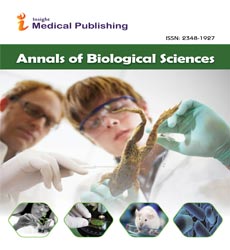ISSN : 2348-1927
Annals of Biological Sciences
Thyroid Hormone Transporters Mct8 and Oatp1c1 Have Distinct Actions in Adult Hippocampal Neurogenesis in Murine
Erica Melena*
iMedPub, Green Lane, London, UK
- Corresponding Author:
- Erica Melena
iMedPub, Green Lane, London, UK
E-mail: annbiolsci@journalres.com
Received Date: December 04, 2021, Accepted Date: December 18, 2021, Published Date: December 24, 2021
Abstract
Mutations in the thyroid hormone (TH) transporter monocarboxylate transporter 8 (MCT8) cause Allan-Herndon-Dudley Syndrome, a severe type of psychomotor impairment, whereas mutations in another TH transporter, organic anion transporting polypeptide 1c1 (OATP1C1), cause juvenile neurodegeneration. These illnesses suggest that TH transporters play critical roles in CNS function. We recently identified Mct8 in adult hippocampus progenitors and mature granule cell neurons, as well as cell-autonomous and indirect Mct8 needs in adult hippocampal neurogenesis. We wanted to see if Oatp1c1 is engaged in the hippocampus neurogenic process together with Mct8.
In the dentate gyrus, we found Oatp1c1 gene expression activity and transcripts in subsets of progenitors, neurons, and niche cells. In 6-month-old Oatp1c1ko and Mct8/Oatp1c1 double knockout (M/Odko) mice, the absence of Oatp1c1 resulted in increased neuroblast and decreased immature neuron counts. Mct8ko and M/Odko mice had lower EdU-label retention, confirming Mct8’s role in neuron development. In the open field arena, however, there was no significant effect of Oatp1c1 deletion on granule cell neuron generation or anxiety-like behaviour. Our findings support the notion that unique activities of each TH transporter are necessary at various times to guarantee adequate adult hippocampus regeneration.
Introduction
Thyroid hormones (THs) play an important role in CNS development and function. TH transporters enhance TH absorption across the bloodbrain barrier (BBB) and blood-cerebrospinal fluid barrier (BCSFB) and also mediate TH transport into neural target cells to enable these CNS effects. One of them, the SLC16A2 gene-encoded monocarboxylate transporter 8 (MCT8), has the best selectivity for the prohormone 3,3,5,5-tetraiodothyronine (thyroxine; T4) and the receptor active form 3,3,5-triiodothyronine (T3). Allan-Herndon-Dudley Syndrome (AHDS) is caused by inactivating mutations in Mct8, a severe type of psychomotor retardation accompanied by aberrant serum TH levels and signs of peripheral thyrotoxicosis.
Furthermore, AHDS patients show signs of hypothyroid brain development, which is thought to be owing to poor TH transport into the CNS. Mutations in the SLCO1C1 gene, which codes for another transporter, the T4 transporter organic anion transporting polypeptide 1c1 (OATP1C1), have been associated to a juvenile type of neurodegeneration, indicating that OATP1C1 has a different function in TH trafficking in the human CNS. Mct8 knockout (Mct8ko) mice duplicate the peripheral TH homeostasis changes but have only modestly lower brain TH concentrations and no obvious gross neurological or motor impairments in research utilizing transgenic knockout mice to simulate human disorders caused by TH transporter defects.
Only simultaneous deletion of Mct8 and Oatp1c1 leads is significantly reduced TH transit into the CNS and AHDS-like symptoms in mice. A species-specific expression pattern of Oatp1c1 in rat but not monkey blood-brain barrier cells explains the necessity for a twofold deletion for the AHDS phenotype. We recently employed a conditional knockout technique to investigate the role of Mct8 in hippocampus neurogenesis, a vital process for normal learning and memory function as well as mood modulation that is known to be strongly dependent on correct TH signaling. We discovered that cell-autonomous Mct8 expression is required for appropriate differentiation into immature neurons and the creation of new granule cell neurons in adult hippocampus neuroblasts. However, it is unclear whether, as suggested by the human neurodegenerative phenotype, Oatp1c1 has a cell-autonomous effect on hippocampal neurogenesis that contributes to the AHDS-like phenotype of the Mct8/Oatp1c1 double knockout (M/Odko) in addition to any effects exerted by the loss of BBB transport function. This topic is addressed here by identifying Oatp1c1 expression in the hippocampus dentate gyrus and comparing adult hippocampal neurogenesis at two separate postnatal time periods in Oatp1c1 knockout (Oatp1c1ko) mice to control, Mct8ko, and M/Odko animals.
Open Access Journals
- Aquaculture & Veterinary Science
- Chemistry & Chemical Sciences
- Clinical Sciences
- Engineering
- General Science
- Genetics & Molecular Biology
- Health Care & Nursing
- Immunology & Microbiology
- Materials Science
- Mathematics & Physics
- Medical Sciences
- Neurology & Psychiatry
- Oncology & Cancer Science
- Pharmaceutical Sciences
